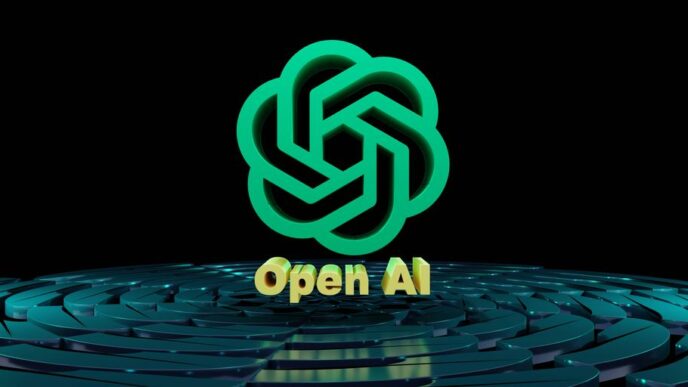So, Bloomberg is looking into what’s next with AI. It’s a big topic, and they’re covering how AI is changing things, where the money is going, and how different industries are using it. Plus, they’re talking about the data side of things and what countries are doing. It’s a lot to take in, but it gives a good picture of where AI is headed.
Key Takeaways
- Bloomberg AI is exploring how generative AI can really change how we do things.
- The way AI affects money markets and the investments being made in AI companies are big talking points.
- Industries like health, cars, and customer service are seeing real changes because of AI.
- Getting good data and keeping it private is important for making AI work well.
- Bloomberg AI’s look at the future includes how we can use AI to make better predictions and give people more personal experiences.
Bloomberg AI: Charting The Next Wave Of Innovation
Artificial intelligence isn’t just a buzzword anymore; it’s actively reshaping how we work, communicate, and even think. At Bloomberg, we’re looking at how this technology is moving forward, what’s new, and where it’s headed. It’s a big shift, and understanding it is key.
Generative AI’s Transformative Potential
Generative AI, the kind that can create text, images, and even code, is a really big deal. Think about writing reports, drafting emails, or even coming up with new marketing ideas. This tech can speed things up a lot. It’s not about replacing people, but about giving them tools to do their jobs better and faster. We’re seeing it used to summarize long documents, create initial drafts of articles, and even help programmers write code more efficiently. The potential for creativity and productivity is huge.
AI’s Impact on Financial Markets
In finance, AI is already making waves. It’s used for trading, risk management, and spotting fraud. Algorithms can process vast amounts of market data much quicker than any human could. This means faster reactions to market changes and potentially better investment decisions. We’re also seeing AI help with customer service in banks, answering common questions and guiding people through processes. It’s changing the speed and accuracy of financial operations.
Ethical Considerations in AI Development
As AI gets more powerful, we have to talk about the rules and how we use it responsibly. Things like making sure AI systems are fair, don’t have biases, and that people’s data is kept safe are really important. Who is responsible when an AI makes a mistake? How do we make sure AI tools are used for good? These aren’t easy questions, but they’re ones we need to keep asking as the technology grows. It’s about building trust and making sure AI benefits everyone.
Investment Trends Shaping The AI Landscape

The money flowing into artificial intelligence is pretty wild right now. It feels like every week there’s a new startup getting a huge chunk of cash, and the big companies are spending billions too. It’s not just about having cool tech anymore; it’s about how this tech can actually make money and change how businesses work. Figuring out where the smart money is going is key to understanding where AI is headed.
Venture Capital in AI Startups
When you look at venture capital, AI startups are definitely getting a lot of attention. Seed rounds are getting bigger, and later-stage funding rounds are seeing massive amounts. It’s a bit of a gold rush, honestly. Investors are looking for companies that can do more than just talk about AI; they want to see actual products and a clear path to making money. Some areas seeing a lot of VC interest include AI for drug discovery, advanced robotics, and tools that help businesses use AI more easily. It’s a competitive space, and getting funding isn’t easy, but the potential rewards are huge if a company hits it big. You can see how companies like Meta and Microsoft are continuing to invest heavily in AI, but it’s still a question if these big spending efforts are actually paying off.
Corporate Investment Strategies
Beyond the startups, established corporations are also making big moves. They’re not just investing in AI companies; they’re also building their own AI capabilities. This often means hiring a lot of AI talent, which is getting really expensive, and investing in the computing power needed to train these models. Some companies are acquiring smaller AI firms to get their technology and teams. Others are partnering with AI providers to integrate AI into their existing products and services. It’s a mix of building, buying, and partnering to stay ahead. The goal is usually to improve efficiency, create new products, or get a better understanding of their customers.
The Role of Public Markets
Public markets are playing a role too, though it’s a bit different. When AI companies go public, their stock prices can be really volatile. Investors are trying to guess which companies will be the long-term winners. Sometimes, just mentioning AI can send a company’s stock up. But there’s also a lot of scrutiny. People want to see real revenue and profits, not just hype. Companies that can show how AI is directly contributing to their bottom line tend to do better. It’s a balancing act between the excitement of new technology and the need for solid financial performance.
Key Sectors Benefiting From Bloomberg AI Advancements
AI is really changing things across a bunch of different industries, and Bloomberg is right there, looking at how it’s making a difference. It’s not just about fancy algorithms anymore; it’s about practical applications that are improving how we work and live.
Healthcare and Life Sciences
In healthcare, AI is a game-changer. Think about drug discovery – it used to take ages and cost a fortune. Now, AI can sift through massive amounts of data to find potential new medicines much faster. It’s also helping doctors diagnose diseases earlier and more accurately. This means better patient outcomes and potentially lower healthcare costs down the line. We’re seeing AI used in everything from analyzing medical images to predicting patient readmission rates. It’s a complex field, but the potential for good is huge.
Automotive and Transportation
When you think about cars, AI is obviously big in self-driving technology. But it’s more than just cars that drive themselves. AI is being used to optimize traffic flow in cities, making commutes shorter and less frustrating. It’s also improving logistics for shipping companies, making sure goods get where they need to go more efficiently. Think about route planning, predictive maintenance for vehicles, and even managing public transport systems. It’s all about making movement smoother and safer.
Customer Service Automation
Nobody likes waiting on hold, right? AI is stepping in to fix that. Chatbots and virtual assistants are getting smarter, able to handle a lot of customer queries without a human needing to get involved. This frees up human agents to deal with the really tricky problems. It’s also about providing 24/7 support, so you can get help whenever you need it. Companies are using AI to analyze customer feedback too, helping them understand what people really want and how they can improve their services. It’s making customer interactions quicker and, hopefully, more pleasant.
The Evolving Role Of Data In AI

Data is really the engine that drives AI, isn’t it? Without good data, even the smartest AI models are just spinning their wheels. We’re seeing a big shift in how companies are thinking about their data, moving from just collecting it to really making it work for them. The quality and how easy it is to get to your data directly impacts how well an AI system performs.
Data Quality and Accessibility
Think about it: if you’re trying to train an AI to recognize cats, but your data has blurry pictures, pictures of dogs mixed in, or labels that are just plain wrong, the AI isn’t going to learn properly. It’s like trying to learn a language from a bad dictionary. Companies are spending more time cleaning up their datasets, making sure the information is accurate, consistent, and properly labeled. This also means making sure the right people can actually access the data they need, when they need it, without a ton of red tape. It’s a big job, but it’s paying off.
Privacy-Preserving AI Techniques
People are rightly concerned about their personal information. So, AI developers are getting creative with ways to train models without actually exposing sensitive data. Techniques like differential privacy add a bit of noise to the data, making it hard to identify individuals, while still allowing the AI to learn general patterns. Federated learning is another cool approach where the AI model is trained on local devices, and only the model updates are sent back, not the raw data itself. It’s a way to get the benefits of AI without compromising privacy.
Leveraging Big Data for Insights
We’re generating more data than ever before, and AI is the key to making sense of it all. Instead of just looking at sales figures from last month, AI can analyze vast amounts of customer behavior, market trends, and even social media chatter to predict what might happen next. This helps businesses make smarter decisions, whether it’s figuring out what products to stock, how to market them, or even how to improve their services. It’s about finding those hidden connections in the noise.
Navigating The Future With Bloomberg AI Insights
So, how do we actually use all this AI stuff to get ahead? It’s not just about building cool tech; it’s about making smarter choices. Bloomberg’s AI work is really about giving people tools to see what’s coming and make better decisions, whether you’re running a business or just trying to understand the market.
Predictive Analytics and Forecasting
Think about trying to guess what will happen next in the stock market or which products will be popular next year. AI can sift through mountains of data – news articles, company reports, social media chatter – way faster than any human could. It spots patterns we might miss. For instance, AI can look at global economic indicators and predict potential shifts in commodity prices. It’s not a crystal ball, of course, but it gives a much clearer picture than just guessing. We’re seeing AI models that can forecast consumer demand with surprising accuracy, helping companies manage their inventory better and avoid waste. It’s about making educated guesses, but with a lot more data behind them.
Personalized User Experiences
Remember when websites just showed you the same thing as everyone else? AI is changing that. Now, platforms can tailor what you see based on what you’ve liked or searched for before. This isn’t just about ads, though that’s part of it. It’s about making information more relevant to you. For example, a financial news app might show you more articles about companies you follow or industries you’re interested in. Bloomberg’s own terminals are getting smarter, showing users the data and news most pertinent to their specific trading strategies. It makes finding what you need much quicker and less of a chore. This kind of personalization makes information feel more useful and less overwhelming.
AI-Driven Decision Making
Ultimately, AI is about helping people make better choices. Instead of relying solely on gut feelings or old ways of doing things, AI provides data-backed suggestions. Imagine a manager trying to decide where to invest company resources. AI can analyze potential returns, risks, and market trends, presenting a clear, data-driven recommendation. This can speed up processes and reduce the chance of costly mistakes. It’s like having a super-smart assistant who’s done all the homework for you. For example, in logistics, AI can optimize delivery routes in real-time, reacting to traffic or weather changes, saving time and fuel. It’s about moving from guesswork to informed action.
Global Perspectives On AI Adoption
It’s fascinating to see how different countries are approaching artificial intelligence. It’s not a one-size-fits-all situation, that’s for sure. Some places are really pushing ahead with new rules, while others are more focused on getting everyone to work together across borders. It makes you wonder what the best way forward really is.
International AI Policy and Regulation
Governments around the world are trying to figure out how to manage AI. It’s a tricky balance, right? They want to encourage innovation but also make sure AI is used safely and fairly. Some countries have put out detailed guidelines, covering things like data privacy and how AI decisions are made. Others are taking a more hands-off approach for now, letting the technology develop before stepping in with strict rules. The goal is to create an environment where AI can grow responsibly.
Cross-Border AI Collaboration
When it comes to AI, problems don’t stop at national borders. That’s why working together internationally is becoming more important. Sharing research, best practices, and even data can speed up progress for everyone. Think about joint projects on things like climate change or disease research, where AI can make a big difference. It’s about pooling resources and ideas to tackle big challenges.
Emerging AI Hubs Worldwide
We’re seeing new centers for AI development pop up in places you might not expect. While the US and China have been major players, other regions are making significant strides. Countries in Europe, Asia, and even parts of Africa are investing in AI research and talent. This spread of AI activity is good for competition and brings diverse perspectives to the field. It’s exciting to watch these new hubs grow and contribute to the global AI conversation.
Looking Ahead
So, what does all this mean for where we’re headed? It’s clear that AI isn’t just a passing trend; it’s changing how we work and live. We’ve seen how new ideas are popping up everywhere, and money is flowing into companies trying to make these ideas real. It’s going to be interesting to watch how these advancements play out. There will be challenges, for sure, but the potential for AI to help us solve big problems seems pretty big. Keep an eye on this space, because the next big thing could be just around the corner.
Frequently Asked Questions
What’s so special about ‘generative AI’?
Think of generative AI as a super-smart computer program that can create new things, like writing stories, making art, or even composing music. It’s changing how we do many jobs and making things happen faster.
How is AI changing the world of money?
AI is making big waves in the stock market and other money-related areas. It helps predict what might happen next and makes trading smarter.
Why do we need to think about ‘ethics’ in AI?
It’s super important to be fair and safe when building AI. We need to make sure AI doesn’t make bad choices or hurt people.
Where is the money going in the AI world?
Lots of money is being put into new AI companies by investors. Big companies are also spending money to use AI in their own businesses.
Which areas are getting the biggest boost from AI?
AI is helping doctors find diseases earlier and create new medicines. It’s also making cars drive themselves and improving how we talk to customer service.
Why is ‘data’ so important for AI?
Good data is like the fuel for AI. The better and easier it is to get data, the smarter AI can become. We also need to protect people’s privacy when using data.














